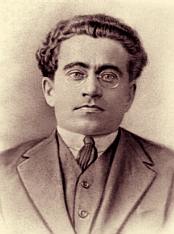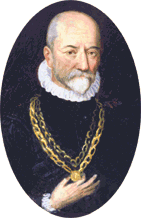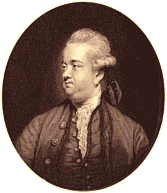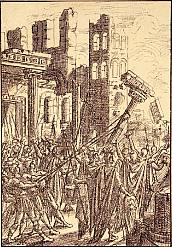
The noted blogger Fjordman is filing this report via Gates of Vienna.
For a complete Fjordman blogography, see The Fjordman Files. There is also a multi-index listing here.

Multiculturalism as a mass movement that has achieved a virtual hegemony in Western discourse was a product of the 1960s and 70s, and was probably exported from the United States. This does not, however, exclude the possibility that certain elements of this ideology are quite a bit older and may have originated in Europe.
 Some would date it to the Frankfurt school of cultural Marxism from the 1920s, and such thinkers as Antonio Gramsci in Italy and Georg Lukacs in Hungary, who aimed at overthrowing capitalism by undermining the hegemonic culture. According to Gramsci, the Socialist revolution, which failed to spread to the West following the Russian Revolution in 1917, could never take place until people were liberated from Western culture, and particularly from their “Christian soul.” As Lukacs said in 1919, “Who will save us from Western Civilization?” This could be done through breaking down traditional Judeo-Christian morality and discrediting and undermining the established institutions from within.
Some would date it to the Frankfurt school of cultural Marxism from the 1920s, and such thinkers as Antonio Gramsci in Italy and Georg Lukacs in Hungary, who aimed at overthrowing capitalism by undermining the hegemonic culture. According to Gramsci, the Socialist revolution, which failed to spread to the West following the Russian Revolution in 1917, could never take place until people were liberated from Western culture, and particularly from their “Christian soul.” As Lukacs said in 1919, “Who will save us from Western Civilization?” This could be done through breaking down traditional Judeo-Christian morality and discrediting and undermining the established institutions from within.However, the concept of cultural relativism is older than Marxism, and dates back at least to the Enlightenment. In the words of Ibn Warraq, “The need and desire to see an alien culture as in some ways superior is as great as the need to see it as inferior.”
 Europe’s first encounter with non-European civilizations started in the 16th century with the Age of Exploration, which is when the notion of the noble savage was fully developed. However, this idea existed long before this. In Germania, written in 98 CE, Tacitus contrasted the virtues of the Germans with the vices of contemporary Rome, the noble simplicity of the Teutonic culture with the corruption of Roman civilization. It wasn’t very accurate, but it worked well as a morality tale, and influenced Gibbon, Rousseau and others later.
Europe’s first encounter with non-European civilizations started in the 16th century with the Age of Exploration, which is when the notion of the noble savage was fully developed. However, this idea existed long before this. In Germania, written in 98 CE, Tacitus contrasted the virtues of the Germans with the vices of contemporary Rome, the noble simplicity of the Teutonic culture with the corruption of Roman civilization. It wasn’t very accurate, but it worked well as a morality tale, and influenced Gibbon, Rousseau and others later.- - - - - - - - - -
According to Ibn Warraq, it was left to Montaigne to develop the first full- length portrait of the noble savage in his celebrated essay “On Cannibals,” (c. 1580) which is the source of the idea of cultural relativism. Montaigne described some of the more gruesome customs of the Brazilian Indians and concluded:
 “I am not so anxious that we should note the horrible savagery of these acts as concerned that, whilst judging their faults so correctly, we should be so blind to our own. I consider it more barbarous to eat a man alive than to eat him dead; to tear by rack and torture a body still full of feeling, to roast it by degrees, and then give it to be trampled and eaten by dogs and swine — a practice which we have not only read about but seen within recent memory, not between ancient enemies, but between neighbours and fellow-citizens and, what is worse, under the cloak of piety and religion — than to roast and eat a man after he is dead”.
“I am not so anxious that we should note the horrible savagery of these acts as concerned that, whilst judging their faults so correctly, we should be so blind to our own. I consider it more barbarous to eat a man alive than to eat him dead; to tear by rack and torture a body still full of feeling, to roast it by degrees, and then give it to be trampled and eaten by dogs and swine — a practice which we have not only read about but seen within recent memory, not between ancient enemies, but between neighbours and fellow-citizens and, what is worse, under the cloak of piety and religion — than to roast and eat a man after he is dead”.Montaigne’s rather dubious, second hand knowledge of these noble savages did not prevent him from condemning his own culture: “[We] surpass them in every kind of barbarity.”
In my view, the main effects of the Enlightenment in Europe were positive, and included more religious freedom, both for Christians and Jews, as well as more freedom of speech in general. The US Constitution and many of the Founding Fathers were strongly influenced by Enlightenment values. The Enlightenment brought us great thinkers such as John Locke, Adam Smith and Montesquieu.
However, there were also elements of Enlightenment thought that led to the radicalism of the French Revolution, and later inspired Marxism and ideas about materialism, historical determinism and utopianism. There was in some observers a tendency to view religion in exclusively negative terms, and to put all emphasis on ideas about human perfection.
 It is possible to trace the anti-Christian, anti-Jewish and pro-Islamic bias of modern Multiculturalism at least back to Enlightenment thinkers such as the 18th century writer and philosopher Voltaire. Voltaire endured numerous imprisonments and exiles for his insistence on criticizing everything and everybody. His exile to England caused him to regard England’s constitutional monarchy as more respectful of religious tolerance than France, which made him unpopular in some French circles. He certainly wasn’t afraid of controversy, and the famous quote attributed to him, “I disapprove of what you say, but I defend to the death your right to say it,” could be a healthy antidote to the censorship of Political Correctness. However, apparently Voltaire never said this. It first appeared in a book written about him in the early 20th century.
It is possible to trace the anti-Christian, anti-Jewish and pro-Islamic bias of modern Multiculturalism at least back to Enlightenment thinkers such as the 18th century writer and philosopher Voltaire. Voltaire endured numerous imprisonments and exiles for his insistence on criticizing everything and everybody. His exile to England caused him to regard England’s constitutional monarchy as more respectful of religious tolerance than France, which made him unpopular in some French circles. He certainly wasn’t afraid of controversy, and the famous quote attributed to him, “I disapprove of what you say, but I defend to the death your right to say it,” could be a healthy antidote to the censorship of Political Correctness. However, apparently Voltaire never said this. It first appeared in a book written about him in the early 20th century.In March 2006, a production of a play by Voltaire entitled “Fanaticism, or Mahomet the Prophet,” caused a stir in the French town of Saint-Genis-Pouilly. According to some Muslims, who called for the staging of the play to be cancelled, “This play ... constitutes an insult to the entire Muslim community.” Instead, Mayor Hubert Bertrand called in police reinforcements to protect the theatre. “Fanaticism” portrays Muhammad as a ruthless tyrant bent on conquest. Its main theme is the use of religion to mask political ambition and it uses the founder of Islam to lampoon all forms of religious intolerance. In a letter to then Pope Benedict XIV, Voltaire called it “a satire on the cruelty and errors of a false prophet.”
Yet according to Ibn Warraq, Voltaire seems to have regretted what he had written of Muhammad in his play Mahomet (1741), where the Prophet is presented as an impostor who enslaved men’s souls: “Assuredly, I have made him out to be more evil than he was.” In his Essai sur les Moeurs, 1756, he shows himself to be prejudiced in Islam’s favor at the expense of Christianity. Voltaire finds the dogmas of Islam simplicity itself: there is but one God, and Muhammad is his Prophet. The superficial rationality of Islam was appealing: no priests, no miracles, no mysteries. To this was added other false beliefs such as Islam’s absolute tolerance of other religions, in contrast to Christian intolerance.
 The History of The Decline and Fall of the Roman Empire was written in six volumes by the celebrated English historian Edward Gibbon. Volume I was published in 1776. According to Gibbon, the Romans had become lazy and soft. This was partly caused by Christianity, whose emphasis on the life after death and ideas about pacifism had sapped the Romans strength to defend their Empire. By the time Gibbon wrote about the decline of the Roman Empire, there was, as historian Bernard Lewis puts it, “a vacancy for an Oriental myth. Islam was in many ways suitable.”
The History of The Decline and Fall of the Roman Empire was written in six volumes by the celebrated English historian Edward Gibbon. Volume I was published in 1776. According to Gibbon, the Romans had become lazy and soft. This was partly caused by Christianity, whose emphasis on the life after death and ideas about pacifism had sapped the Romans strength to defend their Empire. By the time Gibbon wrote about the decline of the Roman Empire, there was, as historian Bernard Lewis puts it, “a vacancy for an Oriental myth. Islam was in many ways suitable.”In the words of Ibn Warraq in Why I am not a Muslim,
“Gibbon, like Voltaire, painted Islam in as favorable a light as possible to better contrast it with Christianity. The English historian emphasized Muhammad’s humanity as a means of indirectly criticizing the Christian doctrine of the divinity of Christ. Gibbon’s anticlericalism led him to underline Islam’s supposed freedom from that accursed class, the priesthood. Indeed, the familiar pattern is reemerging – Islam is being used as a weapon against Christianity. Gibbon’s deistic view of Islam as a rational, priest-free religion, with Muhammad as a wise and tolerant lawgiver, enormously influenced the way all Europeans perceived their sister religion for years to come. Indeed, it established myths that are still accepted totally uncritically by scholars and laymen alike. Both Voltaire and Gibbon subscribed to the myth of Muslim tolerance, which to them meant Turkish tolerance.”
Edward Gibbon saw the battle of Poitiers in France in 732 as a key turning point in European history. Had the Muslims won at Poitiers, “the Arabian fleet might have sailed without a naval combat into the mouth of the Thames. Perhaps the interpretation of the Koran would now be taught in the schools of Oxford, and her pulpits might demonstrate to a circumcised people the sanctity and truth of the revelation of Mahomet.”
Yet according to contemporary Muslim observer Muqtedar Khan, commenting on the several mosques in Oxford, England, and the Oxford Center for Islamic Studies, “Gibbon would have been surprised to learn the lesson that military defeats do not stop the advance of civilizations and the globalization of Islam is unimpeded by the material and military weaknesses of the Muslim world.”
There are superficial similarities between the situation in Western Europe now and the one in the 5th century, when a decadent civilization was overrun by the barbarians. The population movements we are witnessing now are the largest and fastest in human history. In Europe, they can only be compared to the period often referred to as the Migration Period, following the disintegration of the Roman Empire. Yet we now have communications that can transport people anywhere on earth within hours, and media outlets that show ordinary people how much better life is in other countries. On top of that, the Romans didn’t have human rights lawyers advocating that millions of outsiders should be allowed to settle in their lands.
 In some ways, what is going on now surpasses the downfall of the Roman Empire. It has never happened before in human history that an ethnic group voluntarily finances other ethnic groups to advance their culture on their territory to the detriment of their own people. Native Europeans are paying people who openly declare to be our enemies to eradicate our civilization and are told to celebrate this as tolerance. This happens against a backdrop of broken families, social pathologies, widespread abuse of drugs and booming crime rates, while we are shopping expensive Gucci purses and watching naked people do strange things in reality TV shows.
In some ways, what is going on now surpasses the downfall of the Roman Empire. It has never happened before in human history that an ethnic group voluntarily finances other ethnic groups to advance their culture on their territory to the detriment of their own people. Native Europeans are paying people who openly declare to be our enemies to eradicate our civilization and are told to celebrate this as tolerance. This happens against a backdrop of broken families, social pathologies, widespread abuse of drugs and booming crime rates, while we are shopping expensive Gucci purses and watching naked people do strange things in reality TV shows.Maybe in the future, somebody will write a History of the Decline and Fall of Western Europe, or a History of the Decline and Fall of Western Civilization. Gibbon blamed the downfall of the Roman Empire in the 5th century on the advances of Christianity in the 4th century and before. But the collapse of civil society in Western Europe in the 21st century has been preceded by the retreat of Christianity in the 20th century and earlier. There is a strange kind of irony in this historical symmetry that might have surprised Mr. Gibbon.

8 comments:
Somewhat unfocused essay this time.
If speaking of cultural relativism the main actor surely is the extremely influential anthropologist and activist Franz Boas, who was active in US academia up to WWII.
Boas is the primary and explicit link from the enlightenment. He is closely associated with Columbia University : that is, the same university that keys members of the Gramscian Frankfurt school set up shop in the late 30's. The fusing of those two influences during the civil rights movement appears to be the root of modern multiculturalism.
The political correct indoctrination transforms good people into relativists who believe that all cultures are equal good, into cowards with feelings of guilt for things they haven’t done. I don’t have to feel guilty for living in rich Europe. Shames on you who make us feel guilty, to make us defenceless.
The Christian culture is one of guilt, the Muslim one of shame. If we succeed to make the evil-doers feel shame for what they do, will they then stop terrorizing us?
Canute, it's unfortunate that christianity has been so plagued with guilt, as it doesn't exist anywhere in christian scripture. In fact the idea of guilt for past sins is anathaemic to Christ's teachings, and indeed the hebrew culture he spoke from.
I guess people like to feel guilty so they can get a vicarious thrill from absolving themselves.
Voltaire and Gibbon - and their modern day (unconscious) counterparts (in the Media, "progressive" churches, temples, etc.) all make the fatal mistake of bringing in a wildcat (the myth of tolerant "Mohammadism") to drive out an annoying mouse ("illiberal Christianity").
Once the mouse is driven out, they then find that the wildcat cannot and will not be removed.
Trading a cheese nibbling nuisance for a bloodthirsty predator.
Europe has swallowed the self-loathing, ahistorical myths and will pay for their ignorance of their own past and the denial of their human instinct for survival by being replaced by a less-reflective and more rapacious horde.
Known in the local parlance as "guest workers".
(Or, as the Romans called them: "Barbarians".)
Voltaire and Gibbon were restricted with slow flow of information and travel means of the time. What's the excuse of contemporary multiculturalists? Although, it would be interesting to know whether Gibbon and Voltaire read the Koran and the Hadith.
As noted above I think it's doubtful whether Christianity really brought down the Roman empire; 5th century Christianity had absorbed the muscular militarism of Mithraism as well as the mystery-cult of Isis, and was far from pacific. Christians fought the barbarians (our ancestors!), and in the east were still fighting them a thousand years later.
By contrast, it seems pretty clear that cultural Marxism, by laying waste to the West's self-defense mechanisms, greatly facilitates the Islamist takeover of the West.
Odd, I didn’t take Gibbon as an apologist for Islam. I quote him here as a source of Mohammad’s barbaric ethnical cleansing. Enlightenment thinkers were critics of religion. Are you sure your not confusing degrees of damnation as an endorsement for one of the religion over the other? It sounds like "rungs of hell" rather than "I like Islam."
I’d like to know more about Montaigne before I accept your conclusion. Here he is clearly damning both European and Indian. Rather than holding Indian as admirable and Europeans as evil. You say this is cultural relativism but multi-culturalism is supposed to be the idea that they’re all equally good. It seems Montaigne with his damnation of all human beings is more an example of “original sin.” We’re all unworthy, loathsome, “defiled, bespotted and ulcerous (to use St. Augustine’s words.)
I’d bin the blame on Rousseau, who while alive during the Enlightenment period is often considered the father of the counter-Enlightenment and post-modernism. It was Rousseau’s attack civilization, and private property, as corrupting influences that made him a dissenter from the optimistic Enlightenment view of man’s potential. Hicks wrote a recent book on Rousseau and post-modernism. I’ve seen another book in draft form.
I’ll have to re-read Warraq and Gibbon.
I re-read Warraq and the point he makes over and over is that anti-clerical writers were using Islam to shame Christianity. In essence they were saying “you’re worse than a Mohammedan.” Of course, in the process they “went light” on Islam. Warraq ends his discussion (on page 24) with:
“Many of the European apologists of Islam of the seventeenth and eighteenth centuries had no proper acquaintance with the Arabic sources; most had only a superficial knowledge of their subject. They used Islam as a weapon against intolerance, cruelty, dogma, the clergy, and Christianity.”
His next paragraph starts:
“Many European apologists of Islam of the nineteenth and twentieth centuries had a far greater knowledge of Islam and were, by contract, devout Christians – priests, missionaries, curates – who realized that to be consistent they had to accord Islam a large measure of religious equality, to concede religious insight to Muhammad. They recognized that Islam was a sister religion, heavily influenced by Judeo-Christian ideas; and Christianity and Islam stood or fell together.”
Today we have both: those who go light on Islam to make Christianity look as bad (usually by comparing today’s Islam with yesterday’s Christians) and those who see Islam as a lost wayward group of Abraham’s people, only in need of a helping hand to get back on track. Two motivations for denial!
Post a Comment
All comments are subject to pre-approval by blog admins.
Gates of Vienna's rules about comments require that they be civil, temperate, on-topic, and show decorum. For more information, click here.
Users are asked to limit each comment to about 500 words. If you need to say more, leave a link to your own blog.
Also: long or off-topic comments may be posted on news feed threads.
To add a link in a comment, use this format:
<a href="http://mywebsite.com">My Title</a>
Please do not paste long URLs!
Note: Only a member of this blog may post a comment.